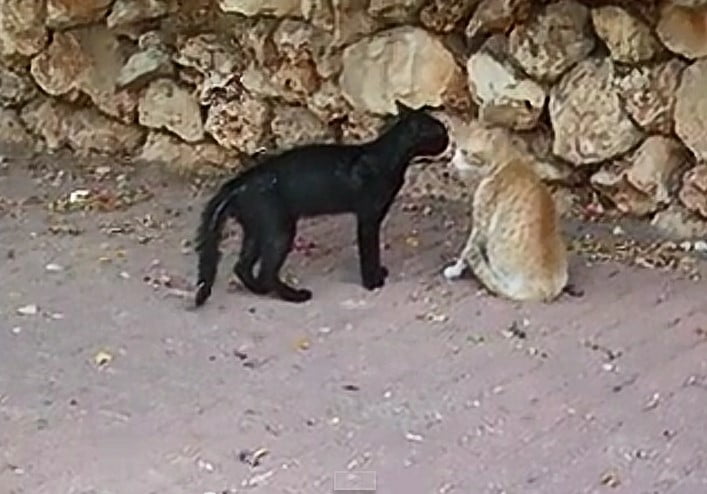With respect to domestic cats, it is possible for one cat to kill another but, in my opinion, it won’t happen deliberately but will be as a consequence of a fight over territory (and it will be very rare). We know that outside domestic cats and feral cats will fight over territory. They can be hurt, sometimes quite badly. They might fall off a roof, for instance. There is the possibility that one of them may be killed as a result.
Domestic cats don’t attack other domestic cats as if they are prey with the intention of eating them.

Wild cat species
With respect to wild cat species, although it will be unusual, larger species may attack smaller species as prey and there will certainly be fights over territory or to remove competition for resources.
I’d like to quote a passage from the best book on wild cat species, Wild Cats of the World by Mel and Fiona Sunquist, if I may:

“Like most of the big cats, lions have been recorded as feeding on almost every imaginable land animal and even a few aquatic species. Ungulates are their principal prey, but birds, hares, ostrich eggs, a python, fish, crocodiles and even other lions are on the list of recorded prey.”Mel and Fiona Sunquist
That passage pretty well sums up how wild cat species of different types interact with each other on occasions. It will be rare because, for instance, the leopard avoids the lion and the lion won’t attack unless he or she has to because there are better prey sources available. Obviously the lion, and other wild cats will pick the easiest prey item and/or the prey item that is the most available at that place and at that time. This won’t be the adult leopard or the cheetah but cheetah cubs will be available.
Cheetah cubs have a high mortality rate. Only 51.4% of eight-week-old-cubs that have emerged from the natal den are alive two weeks later. Two thirds of the cubs are killed by predators and lions are responsible for more than 80% of the predator-caused deaths at cheetah dens. When a lion attacks cubs at their den they kill every cub. They actively search for cubs after they have noticed the cheetah mother. They often kill them by biting them through the skull or spine. Lions rarely eat the cubs that they kill. However, the cheetah mother often eats her dead young after the lions have left.
As for the other wild cat species, it will be rare for one to attack and kill another. Where there is an equality of size they will steer clear of each other. Where there isn’t, the larger might attack the smaller, usually for territorial and anti-social issues. Almost all wild cat species do not attack other cats as prey to eat. That’s my personal view. The lion, as mentioned above is an exception.
Tiger and leopard
The leopard and tiger also live in the same territory but the leopard will avoid the tiger and therefore a tiger attack on a leopard would be extremely rare in my opinion.
“Leopards become extremely cautious around larger predators such as lions and tigers, and prefer to retreat to cover or the safe haven of a tree rather than face a direct encounter. In the Serengeti lions chase leopards whenever they see them, and the leopards invariably climb a tree or retreat to a kopje.”Mel and Fiona Sunquist
In India leopards are said to have a dread of tigers and flee when they come across the scent of a tiger.
